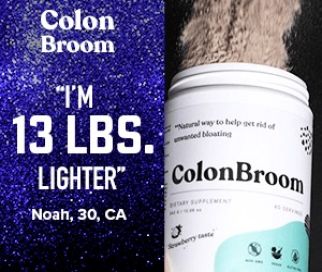Home
How Long Does Colon Broom Take To Work - The Blowup Does Not Stop
How Long Does Colon Broom Take To WorkAlthough most fiber supplements are marketed for short-term constipation, research has shown they can also help with chronic constipation, diarrhea, and all three types of irritable bowel syndrome . Fiber intake is important to maintain a healthy digestive tract and avoid constipation. Insoluble and soluble fibers may also lower "bad" cholesterol, and help prevent digestive problems, heart disease, and type two diabetes. Even though there is no Tolerable Maximum Intake Level, an increase in fiber intake may cause unfavorable gastrointestinal effects. This can also be a concern for supplements containing isolated fibers. This depends on the type of fiber used and how much. Gummy vitamins are booming in the vitamin market. Products such as multivitamins and probiotics have taken gelatinous form in recent years.
How often should I use the psyllium husk
In a 2020 review, psyllium was found to be over 3 times as effective as wheat bran at improving the frequency of bowel movements in individuals with chronic idiopathic constipation. It is a type or soluble fiber which absorbs water and forms gel in the stomach due to its viscosity. These properties allow for better formations of bowel movements that can hold water and pass through the bowels faster. A safe and effective way to relieve constipation and cleanse your body. ColonBroom has the essential fiber and probiotics that your digestive system requires for healthy function.
Colon Broom Subscription - Disturbing Statements Answered
As a consequence, cholesterol levels decrease over time. This could help prevent strokes and heart disease. People with diabetes may also benefit from soluble fiber. This type fiber is a common ingredient of many over-the-counter laxatives.
A 2022 study that spanned 20 years found an inverse relationship between higher dietary fiber intake and dementia risk. All fruits and vegetables are good choices, as well as whole-grain crackers, low fat popcorn, and fresh fruits. A handful of nuts or dried fruits also is a healthy, high-fiber snack -- although be aware that nuts and dried fruits are high in calories.

Functional GI and motility disorders which affect the lower GI tract from the small intestine/bowel, to the large intestine/bowel or colon, to the rectum. Too much fiber can lead to gas, bloating, and cramps. For example, brown rice can be substituted for white rice and whole-grain pasta can be used in place of regular pasta. The most up-to-date information from the world leader in digestive diagnosis and treatment. Some foods and beverages are not appropriate to all ages (e.g., nuts or popcorn), particularly for young children, for whom certain foods could pose a choking hazard. To make a green or vegetarian salad, add peas, kidney beans, or lentils into soups or black beans.
How Long Does Colon Broom Take To WorkColon Broom Cvs
Metamucil is an option if you need a supplement containing psyllium, but not in powdered form. The supplement is available in capsules and chewable tablets, so you don’t have to prepare the daily dose. Side effects can be expected for the first few day as your body isn’t used to taking in all this fiber. You will not experience the side effects mentioned above if you become accustomed to this added fiber intake. It is important to examine the ingredients of any supplement to determine if there are side effects.
Fiber supplements, such as Benefiber, can be found in your local drugstore. They are available both in powdered and tablet form. There are many sources and types of fiber available in each of those four categories. One place to start is by eating more fiber rich foods--fruits, vegetables, whole grains, beans and other legumes, and seeds and nuts. You can also try foods that have fiber added to them, including some breakfast products and snack foods.
Most cohort studies found that fiber intake had little to no correlation with colon cancer. A high intake of fiber was recommended to lower the risk of colon cancer starting around 30 years ago. This recommendation was largely inspired by observations that colon cancer rates are lower in countries that have a high fiber intake than in those with a lower intake.
Colon Broom For Sale - Why Almost Everything You have Read About This Product Is Totally Wrong
Several studies show that soluble fiber helps regulate stool frequency and consistency in people with IBS. Bran and Psyllium are two of the most well-studied soluble fiber sources for IBS treatment. Can a fibre supplement be used to treat irritable bowel disease in people who are on a low FODMAP (or modified FODMAP) diet? Before we answer the question, let's first define fibre. Where can you find it? What are its benefits? And when is your diet at risk for being low in fiber. A high-fiber diet decreases the chance of developing diseases. It is also beneficial for the health and wellbeing of the digestive and cardiovascular systems.
Colon Broom Appetite Suppressant - The Ultimate Exposition
PLUS, the latest news from Harvard Medical School experts on medical breakthroughs and medical advances. It's quite different if you are taking a fiber supplement. Fiber passes through the digestive tract without being digested or absorbed.
How Long Does Colon Broom Take To WorkPrevious Next
Top Articles:
Where Can I Buy Colon Broom - What You Don't Know But Need To About This Product
How Quickly Does Colon Broom Work - The Truth
How Long Does Colon Broom Take To Work - What Everybody Should Know
Colon Broom How To Use - The Rarely Talked About Truth About This Product That A Lot Of People Do not Have Any Knowledge About
Colon Broom V Metamucil - Fraud, Deceptions, And Absolute Lies About This Product Finally Revealed
***
Categories
Copyright© Colon Broom All Rights Reserved Worldwide